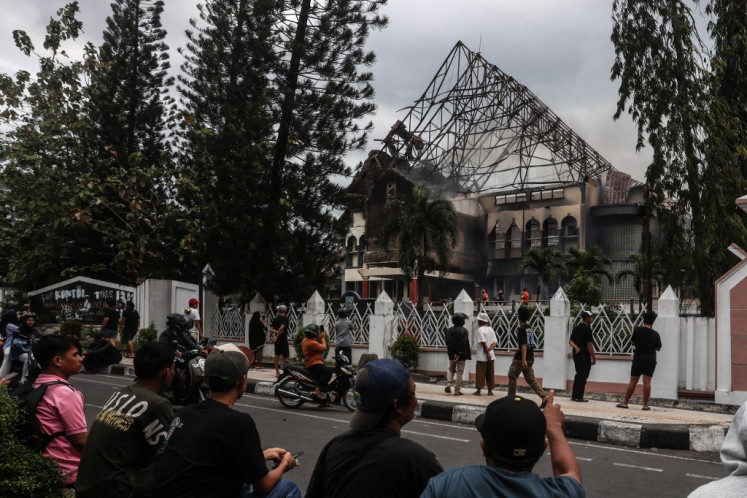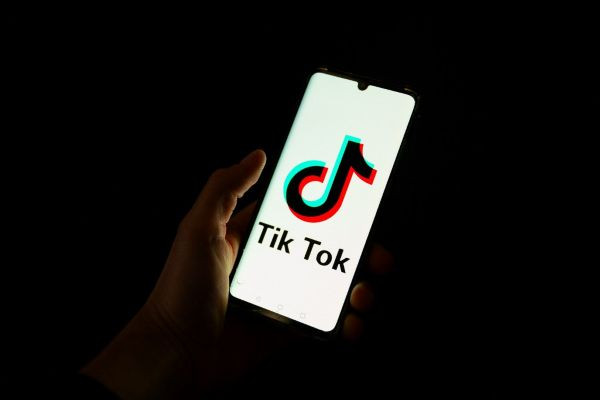Popular Reads
Top Results
Can't find what you're looking for?
View all search resultsPopular Reads
Top Results
Can't find what you're looking for?
View all search resultsTransparency key in water service takeover: Activists
Activists have questioned the transparency of the Jakarta administration’s plan to take over the tap water management from its long-time private partners as announced by Jakarta Governor Anies Baswedan in February, although no significant changes have been made so far
Change text size
Gift Premium Articles
to Anyone
A
ctivists have questioned the transparency of the Jakarta administration’s plan to take over the tap water management from its long-time private partners as announced by Jakarta Governor Anies Baswedan in February, although no significant changes have been made so far.
Anies said recently that he would announce his next step on April 8, when asked about the progress of the remunicipalization plan. He did not give further details about it.
Anies, who established the Water Management Evaluation Team last year, has decided to renegotiate the contract with private water companies PT PAM Lyonnaise Jaya (Palyja) and PT Aetra Air Jakarta whose contracts expire in 2023.
His administration, through the evaluation team, has mulled several options like acquiring shares in the companies or terminating the contract. However, the latter option would come with a hefty cost as the compensation the city would have to pay could reach more than Rp 1 trillion (US$70.64 million).
Several activists have demanded that Anies should be more transparent when conducting the remunicipalization process, a global trend in which local authorities retake control of privatized water services.
The Rujak Center for Urban Studies’ executive director, Elisa Sutanudjaja, said transparency was vital because even though the tap water business in the city was lucrative, the city-owned water company still suffered a deficit.
She cited findings by the Supreme Audit Agency in 2017 that revealed PAM Jaya suffered an accumulated loss of Rp 1.4 trillion since forging a cooperation deal with its private partners in 1998. The finding also stated that PAM Jaya had to pay shortfalls to Palyja and Aetra, of Rp 396 billion and Rp 237 billion, respectively, as water charges from the company.
Noticing the large amount of money involved between the city and the companies as well as further potential losses, Elisa called on the Corruption Eradication Commission to oversee renegotiations.
“Twenty-one years have passed since the private companies took over managing the city’s tap water. So much money has been lost and the service is not improving,” she said on Wednesday.
In 1995, former president Soeharto appointed two foreign companies to manage the capital’s water in the hope that privatization would provide Jakartans with equal access to tap water.
In 1997, PAM Jaya signed a 25-year management agreement with the companies, with the contract stating that it will only act as a supervisor. Palyja is in charge of water operations in the western half of the city, while PT Aetra Air is responsible for the eastern half. Both of them are also responsible for ensuring a raw water supply and cleaning it, as well the pipe network and customer service.
The Jakarta administration is aiming to achieve 82 percent tap water coverage by 2023 but its realization has been slow under the private firms’ management.
According to data from PAM Jaya, the tap water service only covered 60 percent of the capital, a sluggish increase from 44.5 percent in 1998.
“Many urban kampung I’m working with in North and West Jakarta have problems accessing tap water. Some kampung residents have received bills although they never got the water. Some can access their tap water for only an hour a day,” Elisa said.
This has forced residents to buy water from vendors or to use groundwater.
The Lokataru Foundation’s director, Haris Azhar, said the situation was hitting the poor hard because they were spending more money compared to other tap water customers. The companies sell their water at approximately Rp 7,500 per cubic meter, while those without tap water pay Rp 2,500 per jerry can, which contains only 20 liters of water.
He called on Anies to implement a clear takeover program to ensure justice for the urban poor.
“While taking over the tap water management, he should start thinking about improving the service. The [pipe] infrastructure, the price, the quantity and the source of water, and many others,” Haris said.
As someone who has been observing and writing about the city tap water dispute for more than a decade, Human Rights Watch Indonesia researcher Andreas Harsono said the city always had issues with transparency.
“The team reportedly has held several meetings. But we never know when, how many times the meetings have been held, how many people were involved, who are they,” Andreas added.










